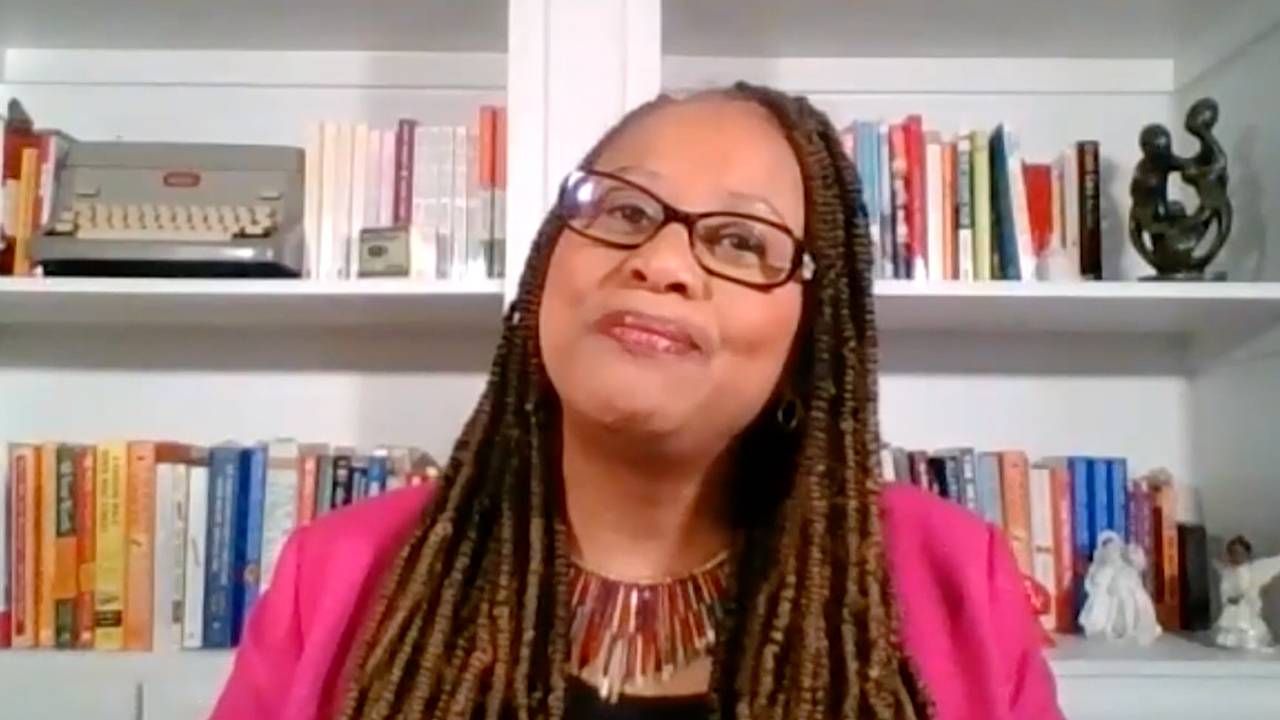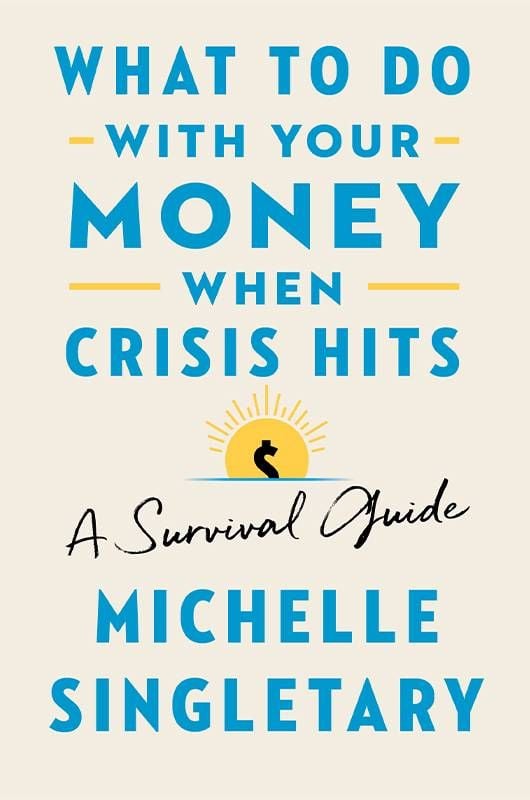Personal Finance Writer Michelle Singletary Gets Personal
A candid chat with the columnist and author of 'What to Do With Your Money When Crisis Hits'
Straightforward, realistic, empathetic, side-splitting funny — Washington Post syndicated personal finance columnist Michelle Singletary is all the above.

Her column is labeled "Perspective," and it's one that we all need a dose of, especially now.
"I don't ever want people to feel as if they are at a loss."
I was delighted to discover that Singletary has just written a smart, new, accessible book: "What to Do With Your Money When Crisis Hits: A Survival Guide." And it's chock-a-block full of helpful questions and answers gleaned from her readers on topics ranging from paying down debt to how to get better at money management to the best option for medical coverage to how to invest if you're close to retirement.
I've been a fan girl of Singletary, who is in her late 50s, for years and have been fortunate to meet her at conferences and laugh out loud at her keynote speeches. When I had the opportunity to chat with her recently about her new book and her journey, I jumped at it.
What Singletary Told a Money-Nervous Woman
Singletary launched our talk with a story that will resonate with many Next Avenue readers, about one time when she was on a panel with various financial professionals. An African American woman in her 50s stood up and said she had a difficult work history, had raised a family and hadn't a chance to save for retirement. "What can I do?" she asked.
"The financial planner then started to say, 'Well, I have a client who has a million and a half and I'm not sure she's going to have enough for retirement," said Singletary. "And I could see this woman's face and her body language, saying 'Well, if a woman who has a million and a half isn't going to make it, what in the world am I going to do?'"
Singletary piped up with her trademark Singletary solutions. "Listen, it doesn't matter what age you are," she told the woman. "You can have a good retirement. It may mean that you must make some different decisions. It may mean that you can't stop working at sixty or sixty-five, if you're physically able. You may want to work. It may mean that you have a shared housing situation."
Singletary's take on that encounter: "I don't ever want people to feel as if they are at a loss," she says. "What I said to her next was 'Now that we know that you're behind, let's see what kind of decisions you can make. Let's look at how you're doing your spending. Are there places that you can cut? Can you hold onto that car for another ten years? Let's look at where the big items are that we can mine the money to save for your retirement.'"
And those are precisely the kinds of roll-up-your-sleeves-and-get-down-to-it action steps Singletary regularly espouses.
Sometimes, she's a bit contrarian. Like with paying down debt. Her advice: start small, for quick victories.

"If they start with the small debts first, then they have a sense of accomplishment," she says. "What ends up happening is if they are able to get rid of some debt so quickly, that gives them a sense of motivation to keep it going and go stronger. They actually get out of debt faster and pay less in interest than when they concentrate on the one with the highest interest rate, which many advisers recommend."
A Frank Money Talk With Her Husband
I had to smile when she turned the page on the hardcore thrifty advice she's known for to a discussion of giving yourself permission to spend.
Singletary admits she has trouble with this herself. "People are afraid to spend, particularly in retirement, because they're worried about outliving their money," she says. "As a result, you don't really get to enjoy the money that you drill, drill, drill to save for this period in your life."
But, she adds, "You can spend and still have that safety."
Singletary gets that fear — firsthand.
"I have spent my whole life being frugal and now my husband [Kevin McIntyre] is like, 'We could go do that.' I'm like, 'Oh no, we can't do that.' He says, 'But Michelle, when will we spend this money that we've saved for?' And I say, 'But what if I get sick?' And he reminds me that we're going to pay off our mortgage before we are retired, and he has a retirement account and I have a retirement account. We're going to have Social Security. He has a pension; I have a pension. He says, 'Baby, we are good. We're good. Let it go.'"
Singletary advises those nearing retirement age to seek out advice from a pro. "This may be the time when you can start spending your savings, where you need the help of a qualified financial planner, fee-only [one who doesn't charge commissions] and a fiduciary, meaning that whatever advice they give you is in your best interest."
While the advice in Singletary's new book is for all ages, races and genders, last year, she embraced the racial discussion that's been top of mind for her. Singletary wrote an outstanding 10-part series for The Washington Post on misunderstandings about race and money called "Sincerely, Michelle."
"Oftentimes, when you're seen as the 'Black candidate,' you're seen as subpar, that they just had to hire you because you were Black."
It featured very personal letters from Singletary, who is Black, to her white readers.
One discussed affirmative action and the impact it has had on her as a professional, starting with when she was hired by The Washington Post.
Looking Back and Giving Back
"Oftentimes, when you're seen as the 'Black candidate,' you're seen as subpar, that they just had to hire you because you were Black," she told me. "It was really hard with people always questioning my credentials. I had to justify myself continuously. Some colleagues at The Washington Post were talking behind my back and I asked my editor at the time: Did he hire me because I was Black?"
The crushing answer: yes.
"He invited me into his office to talk about it further," Singletary said. "He went on to say, 'I hired you because you were Black. I hired you because you're a woman. I hired you because you have a master's degree in business. And I hired you because you grew up in the inner city and were low-income. And all of those things make you a better financial reporter.'"
Singletary not only writes and speaks about personal finance, she also gets into the mix with it as a way of giving back.
She and her husband volunteer at correctional facilities in Maryland, teaching financial literacy to prison inmates.
And Singletary is director of Prosperity Partners Ministry, a financial program she founded at her church, First Baptist Church of Glenarden, Md. Through the ministry, Singletary mentors on financial topics.
During the year-long program, she presents a monthly three-hour class. Those who enroll bring their bank statements for at least six months, retirement account information and even credit reports. It's full disclosure.
Participants get paired with a money accountability partner. "These are people who walk alongside the folks in the program to make sure they do their budget or make sure they meet their financial goals or make sure they have a will or make sure they are saving for retirement," Singletary says.
She modeled the program after Alcoholics Anonymous.
"If you've ever been to an AA meeting, they have sponsors," she said. "They're not necessarily licensed counselors. There's just like accountability folks. And it's that same principle here. It's hard when you're trying to develop better financial decisions or behaviors to not fall back to old habits. This gives you someone to call."
The program often partners a young person with someone in their fifties and sixties. That's quite intentional. "You have multi-generations of folks helping each other. And it's just so wonderful to see," said Singletary.


